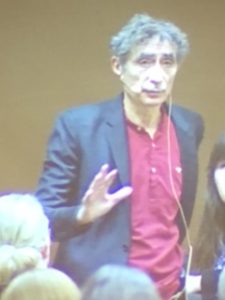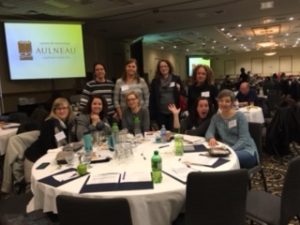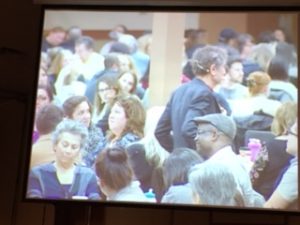I have often wondered where it begins. Can the traumas of our parents, our grandparents, play out in our everyday life? Are they woven into the very fabric of our DNA, or our neural synapses? Or perhaps it’s what we learn when our caregivers are used to living in a constant place of self-preservation, and in a society that has failed to make them feel safe. Perhaps it is all of these things.
When you live in a family that has a history of childhood traumas like sexual and physical abuse, neglect, or the impacts of colonization and racism, it appears you are at greater risk of poor health and mental health outcomes. Nothing has demonstrated this with more clarity then the foundational The Adverse Childhood Experiences (ACE) Study that has led organizations around the world, including the US Centre for Disease Control, to call for greater focus on trauma and the prevention of adverse childhood experiences.
At Klinic, we have been talking about the importance of trauma-informed care for quite some time. Through the Manitoba Trauma Information and Education Centre we work to provide training and support to people and organizations wanting to establish more trauma-informed practice, and our counselling services focus on working with people who have experienced personal trauma.

I, personally, have been a fan of Dr. Gabor Mate for a very long time. Like many, I am impressed by the way he has used his work with people living with addictions to built a framework for understanding addiction and other suffering through the lens of trauma or adverse childhood events.
I was very pleased to have had the opportunity last week, to join approximately 1300 people (including a significant contingent from Klinic) who were spending the day with Dr. Mate, an event sponsored by the Laurel Centre and Marymound.

I can’t possibly describe or overview this day in a way that will begin to capture all of what I took from it. However, as both a leader in organizations that work with marginalized people, and a human whose own family closet is knee deep in the skeletons of my ancestors, I would like to share a few of my special learnings.
One of the concerns we sometimes hear about using a trauma-informed perspective, is the idea that we are medicalizing what are actually common, though sad, life experiences. I was thinking of this when Dr. Mate started very early on with discussing his own concerns with the over-medicalization of mental health issues, and the lack of approaches that recognize how the problem occurs within families and society. Essentially, he argues that we both cause and are affected by generations worth of trauma, even if we are not consciously aware of it.
If we as a society were to embrace a trauma-informed approach, would we punish our children in the same ways? What about people with addictions? What we know about humans, is that we are social creatures, and the more separated we become from our fellow humans, the greater the impact trauma can have on us. What does this mean for simple and popular childhood behaviour strategies, like ‘time out’? Or letting a baby cry? In our adult world this model of separation becomes our jails and institutions. Is there a better way?
When my grandmother was a child she spent many years being schooled by nuns in a convent, the very same nuns who raised her own mother in an orphanage. Though I am sure both of these amazing women had many experiences that challenged their personal resilience, I will never forget the heartbreak that my grandmother described when she was punished by temporary excommunication. Imagine living amongst your peers and caregivers for weeks while they have been told not to speak to you, not to care for you, living like a ghost in your own home.
Dr. Mate takes the position that the majority of addiction and mental health issues, in fact, many health problems, are passed down generationally both through our bodies in development and our behaviours, and therefore the trauma of our histories impacts us in a very real way in our day-to-day lives. If we don’t have the language or have not developed the skills or attachments to articulate our pain, then this can result in a host of non-helpful behaviours. As he describes: you act something out when you don’t have the language to say it in words. As a society, we help continue the cycle by punishing and stigmatizing these behaviours. Most of us have developed some form of maladaptive coping skills that likely served us at one time; this may include addiction to a chemical, or a certain behaviour, like shopping, comfort eating or sex. The key is that the addiction creates the brain chemistry response that soothes our pain. I think anyone who has experienced any kind of addiction (I would suggest, in this definition, is most of us) can relate. A key issue is that as a society we have decided that some addictions are acceptable, and some are not, leading to further pain and stigmatization for those who are addicted to things we deem as unsavoury.
So how does this help us understand issues like addiction, and appropriately support our clients, our friends, and ourselves? To start, perhaps we don’t ask what’s wrong with the behaviour, but what is its function in that person’s life? How has this behaviour served them in the past and how can we assist in developing coping skills or behaviours that may effectively replace the one that appears to be hurting them? How do we not make assumptions that the behaviour is hurting them in a manner that requires change?
Dr. Mate’s focus on the personal experience and not creating hierarchies of trauma and addiction also struck me. The idea that trauma may not be that people have treated you badly, or you experienced a major life event, it may be enough that your caregivers are suffering themselves; the key to it is how you experience it, not what the event is.
For example in this room full of helpers, Dr. Mate postulates that for many, a response to not feeling wanted as a child is to base your life around helping others, which is part of his personal experience. This may work effectively for some time, but may become maladaptive if our entire life becomes about helping others, without setting personal boundaries.

He talks about the current environment that includes increasingly higher numbers of youth reporting anxiety and depression as, perhaps, not an epidemic of bad parenting, but an epidemic of stressed parenting in an increasingly demanding and technology-dependent world. Dr. Mate believes we have lost some of the basis of healthy human development and that we need to understand what we lost and work to restore it. He talks about creating a world that supports healthy pregnancies and early parenting, as well as a need for all services to be trauma-informed and compassion based.
Dr. Mate speaks of the importance of tools that we use at Klinic and I have written about before, such as EMDR and mindfulness, to help reconnect to ourselves and our bodies. Trauma can make it difficult for us to be in the present moment because it triggers us to past emotion. It can be helpful to retrain our brain to get out of this constant looping back.
Past trauma or adverse events can give some a tremendous pain they may spend their whole life trying to escape from. We may develop a view of ourselves as being the cause, the idea that bad things happen to us because we are bad people. As the Buddha said with our thoughts we make the world. The catch-22 is that first, the world must create our minds.
Reducing the impact of trauma and adverse childhood events starts inside us individually with each of us developing a personal understanding of our own experiences and triggers. You likely wouldn’t talk to others in the way that you talk to yourself, so reflect: why am I doing this? ;use the same approach of compassionate inquiry. When compassion is present, people are more able to allow themselves to see the truth.
Accept and understand that we live in a society that can be traumatizing, and that our ability to respond to trauma in ourselves and others, is impacted by our own experiences. You aren’t responsible for how anyone feels, but you are responsible for your own actions and intentions. How can you help shape a world that is more compassionate and understanding of the common and shared pain of difficult human experiences?
At Klinic we recently completed our position paper on trauma-informed practice and a checklist that organizations can utilize to help develop trauma-informed practices. We hope that these and the resources available through the Manitoba Trauma Information and Education Centre are helpful to others who are trying to walk this path.

